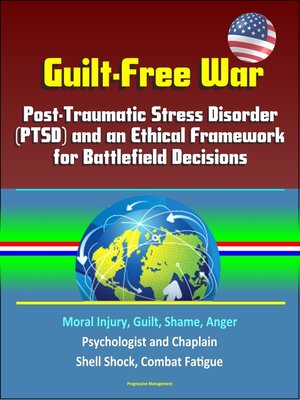Guilt-Free War
ebook ∣ Post-Traumatic Stress Disorder (PTSD) and an Ethical Framework for Battlefield Decisions--Moral Injury, Guilt, Shame, Anger, Psychologist and Chaplain, Shell Shock, Combat Fatigue
By Progressive Management

Sign up to save your library
With an OverDrive account, you can save your favorite libraries for at-a-glance information about availability. Find out more about OverDrive accounts.
Find this title in Libby, the library reading app by OverDrive.



Search for a digital library with this title
Title found at these libraries:
| Library Name | Distance |
|---|---|
| Loading... |
This excellent report has been professionally converted for accurate flowing-text e-book format reproduction. Post-traumatic stress disorder (PTSD) affects roughly 15 percent of all combat veterans. In a combat situation, when a warrior experiences a moral dilemma that violates a deeply held conviction, he or she suffers a moral injury. These moral injuries and the combat guilt that accompanies such injuries are a leading cause in the development of PTSD. Today's warriors are even more vulnerable to moral injuries, given the ambivalence surrounding morality in general. Compounding this situation are increasingly restrictive rules of engagement against an unseen enemy who does not appear to follow any rules at all. These dynamics increase the vulnerability of US warriors to moral injuries. Given the connections between moral injury, guilt, and post-traumatic stress, this paper seeks to open a dialogue on the need for the development of an ethical framework that can guide warriors in making battlefield decisions, providing possible armor against moral injury and assisting warriors in their reflection on previous involvement.
War has always been complex, and as our strike capability changes with remotely piloted aircraft, and in light of the reality that the desired end state of our recent conflicts has been fuzzy at best, some of our nation's warriors are struggling with guilt and confusion about why they did (or were not allowed to) take that last shot. They are serving with honor without knowing why they are serving, and as such they are ripe to sustain moral injury.
There's an old adage that "war is hell." For many, though, war is simply the beginning of hell. Historically, approximately 15 percent of returning warriors struggle with the long-term effects of the unseen wound of posttraumatic stress disorder (PTSD). Current fiscal estimates show that warriors suffering from PTSD received during tours in the last 20 years will cost the US government more than $6 billion. Cost considerations alone should prompt us to work to understand and minimize causes of PTSD.







